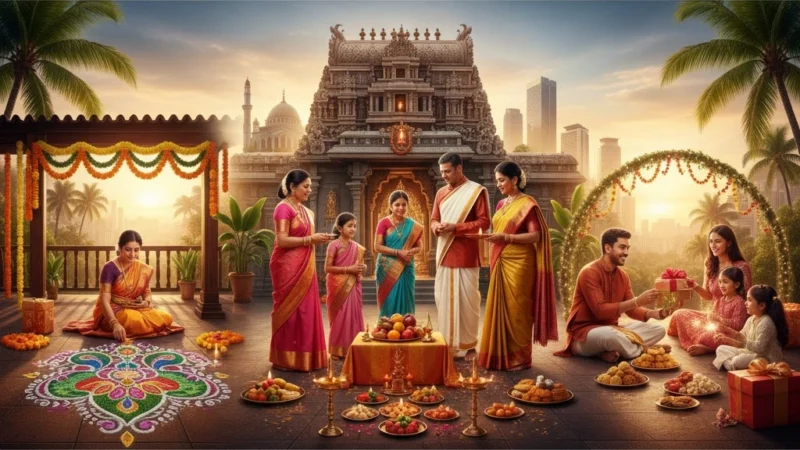Deepavali Rituals Across Malaysian States

Deepavali, also known as Diwali, is one of the most celebrated festivals by the Malaysian Indian community. Rooted in Hindu mythology, it symbolizes the victory of light over darkness and good over evil. In Malaysia, Deepavali has evolved into a vibrant cultural celebration that brings families and communities together through traditional rituals, temple visits, and festive foods.
This article explores Deepavali traditions in Malaysia, highlighting how celebrations differ across states like Penang, Kuala Lumpur, Johor, and Ipoh, and the role of iconic Indian temples such as Batu Caves and Sri Mahamariamman Temple.
Origins of Deepavali in Malaysia
Deepavali was introduced to Malaysia by Indian immigrants, primarily Tamil Hindus, during the colonial period. The festival originally centered around religious rituals and prayers for prosperity and wellbeing. Over time, it has expanded into a nationwide cultural celebration, incorporating local influences while retaining its spiritual significance.
Key elements of Malaysian Deepavali history and culture include:
- Lighting oil lamps (diyas) to symbolize light over darkness.
- Preparing rangoli (kolam) designs at the entrance of homes.
- Offering prayers to Goddess Lakshmi for wealth and prosperity.
- Sharing sweets and festive meals with family, friends, and neighbors.
Traditional Customs and Rituals
Home Preparations
Families begin preparations weeks before Deepavali by cleaning and decorating their homes. This act symbolizes the removal of negativity and welcomes prosperity.
Decorations include:
- Diyas (oil lamps) lining windows and doorways.
- Colorful rangoli designs at entrances.
- Strings of marigold flowers and mango leaves.
Religious Practices
On the main day of Deepavali, families perform prayers and offerings to deities. Special rituals include:
- Puja (prayer ceremony): Conducted at home and in temples, seeking blessings for health and wealth.
- Fireworks: In some regions, bursting crackers signifies warding off evil spirits.
- Charity: Donating food or clothes to the needy is considered auspicious.
Regional Differences in Deepavali Celebrations
Penang
Penang is known for its rich Indian heritage. Here, Deepavali traditions in Malaysia are marked by vibrant street decorations, night markets, and temple festivals. Major temples like Arulmigu Balathandayuthapani Temple host grand ceremonies, attracting devotees from across the region.
Kuala Lumpur
In the capital, Malaysian Indian festival celebrations are centered around iconic temples such as Batu Caves and Sri Mahamariamman Temple. Thousands of devotees participate in early morning prayers, processions, and cultural performances. KL’s Little India is beautifully illuminated with lights and bustling with festive markets.
Johor
Johor’s Indian community combines traditional rituals with local cultural elements. Homes are adorned with rangoli, and community centers organize cultural programs, music, and dance. Families often visit temples for Lakshmi Puja and partake in communal feasts.
Ipoh
In Ipoh, Deepavali is celebrated with strong family-oriented traditions. Homemade sweets and savories like murukku, laddu, and payasam are prepared and shared. Temple visits are often followed by visits to relatives and friends, reinforcing social bonds.
Traditional Foods and Sweets
Deepavali celebrations are incomplete without festive foods. Popular dishes across Malaysia include:
- Murukku: Crunchy rice flour snacks.
- Laddu: Sweet, round confections made of chickpea flour.
- Curry dishes: Rich and spicy vegetarian curries served with rice or puris.
- Payasam: Sweet pudding made from milk, sugar, and rice or vermicelli.
These dishes are prepared with care and often shared with neighbors and community members as a gesture of goodwill.
The Role of Temples in Deepavali
Temples are at the heart of Malaysian Deepavali celebrations. Notable temples include:
- Batu Caves, Kuala Lumpur: Famous for its grand Deepavali processions and rituals attracting thousands of devotees.
- Sri Mahamariamman Temple, KL: Hosts elaborate pujas and cultural performances.
- Arulmigu Balathandayuthapani Temple, Penang: Organizes community feasts, cultural activities, and firework displays.
These temples act as cultural hubs, preserving Indian traditions and fostering a sense of community.
Family Practices and Community Bonding
Deepavali is also a time for family gatherings and strengthening social ties. Common practices include:
- Exchanging gifts among family and friends.
- Visiting relatives to offer blessings.
- Community events featuring music, dance, and storytelling of Deepavali myths.
Through these practices, where to celebrate Deepavali in Malaysia becomes a mix of home, temple, and community events, offering rich experiences for locals and visitors alike.
Conclusion
Deepavali in Malaysia is more than a festival; it is a cultural tapestry weaving religion, tradition, food, and community. From the elaborate rituals at Batu Caves to home-based family celebrations in Ipoh, each state offers a unique glimpse into Malaysian Deepavali history and culture. Whether you are exploring temples, tasting traditional sweets, or admiring colorful decorations, Deepavali is a festival that illuminates Malaysia with joy, unity, and light.







Comments are closed.